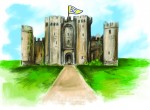Meredith Cohen views the UCLA Center for Medieval and Renaissance Studies as a form of time travel.
Through the center’s many lectures and conferences, Cohen, a professor in the UCLA Department of Art History, can access knowledge about French art dating back to the medieval and early modern periods.
The center, housed in Royce Hall, offers her a chance to work with experts who share her academic passions.
“If you don’t have dialogue, you don’t have knowledge,” she said.
The brainchild of Lynn White Jr., professor emeritus of history at UCLA, the center is celebrating its 50th anniversary this year.
But prompted by recent budget problems, the center’s anniversary also marks the start of a fundraising campaign to support its operation, said Massimo Ciavolella, the center’s director.
The Center for Medieval and Renaissance Studies aims to promote the research of faculty and graduate students in disciplines across 28 different departments at UCLA, including history, medicine, comparative literature and language programs, Ciavolella said.
The center also sponsors seminars, in addition to publishing academic journals and books.
Ciavolella said he has reached out to graduate students and encouraged them to become more involved in the center because he thinks graduate students have innovative ideas about teaching and research.
Alexandra Zobel, a graduate student in English and the co-chair of the Medieval and Early Modern Student Association, said the center helps break down boundaries between different disciplines, including the varied subjects she studies.
Zobel and other graduate students will hold a conference about teaching medieval and early modern studies to students in June – one of the many projects that the center funds.
“A lot of (organizations) pay lip service to the idea of interdisciplinarity,” she said.
“But the center really works to make it so disciplinary lines are artificial.”
Endowments, gifts, grants and state funds currently support the center’s services, she said.
Yet, recent cuts in state funding – combined with a tax on the center’s expenditures implemented this year – may put some of the center’s services in jeopardy in future years, said Karen Burgess, the center’s assistant director.
The center may have to offer fewer research assistantships for graduate students or hold fewer conferences, she said.
In June 2010, the center’s state funding was cut by about $34,000, Burgess said.
Last year, UCLA Graduate Division withdrew about $3,000 in funds from its annual support of the center.
This year, the center has had to pay about $15,000 in taxes – an amount that may double next year – for its expenditures.
Many departments at UCLA have faced cuts in state funding and have had to look for alternative funding sources to fill the gap.
The Center for Medieval and Renaissance Studies has had to use more money than in past years from its endowments – which produce yearly interest – to cover part of its expenses.
“Costs go up and the money goes down,” Burgess said.
Joseph Nagy, a professor in the English department, sits on the faculty advisory committee for the center and has helped organize and been a part of some of the center’s various conferences.
Nagy said the center has developed as an international resource over time and has kept up with academic trends, like focusing its studies beyond Europe to include Asia and the Mediterranean.
But without sufficient funds, it may be hard for the center to continue expanding, Nagy said.
“I hope there’s (financial) relief in sight,” Nagy said.
Despite the center’s decreasing funding, however, Ciavolella said he thinks research centers have become more important for graduate students in recent years, since they offer funding to students who can no longer find support elsewhere.
Leanne Good, an assistant lecturer in UCLA’s history department and former graduate student in history at UCLA, credits much of the professional education she has gained at UCLA to the center.
“If I were just going to be a scholar and sit in a library all day, I would never advance,” she said.
“It would just be me alone with my ideas.”
Good is now on track for a tenured position teaching medieval history and has been involved with the center for the past 10 years.
“(The center) has really been so much a part of my experience there,” she said.
“The professionalization – actually becoming a member of the academic community – happened through (it).”
